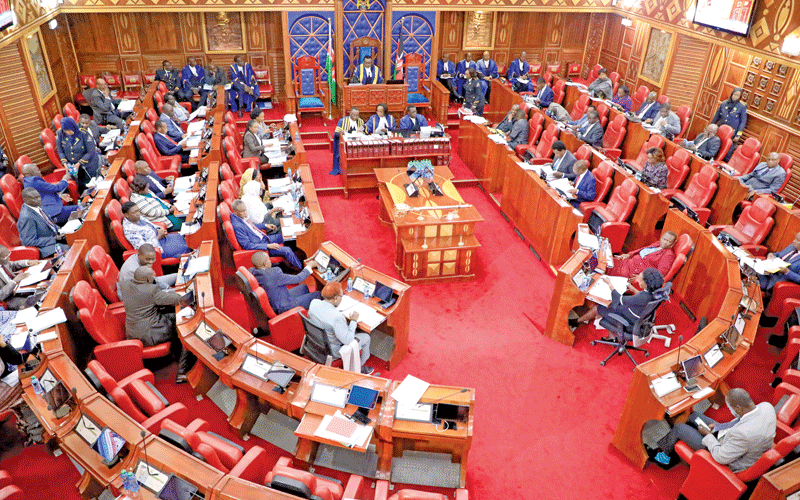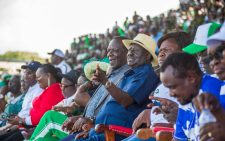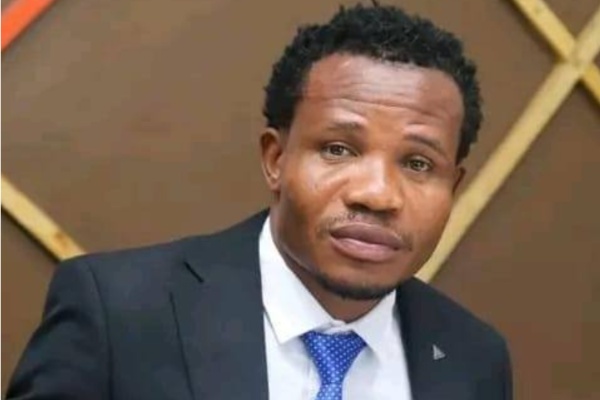Senate adjourns again after revenue deadlock persists

President Uhuru Kenyatta and Opposition chief Raila Odinga could be forced to step in to unlock the deadlock over the disputed formula for sharing revenue among the 47 counties.
The Senate was yesterday compelled to adjourn a Special Sitting convened for the second time to vote for the formula that has divided the House down the middle.
It followed spirited resistance by senators whose counties were set to lose cash under the proposed arrangement.
A day-long informal gathering (Kamukunji) convened by Speaker Ken Lusaka to build consensus on proposals by the Committee on Finance and Budget ended in disarray after lawmakers whose counties were set to lose up to Sh17 billion stood their ground and vowed to reject the proposal in the House.
They got the support of at least five other senators, mainly from areas controlled by the Orange Democratic Movement (ODM) as well as the Wiper Party, who argued that the formula was “about to split the country into two”.
“This formula was not going to pass and if it did, then this country was going to be divided into two and there would be no referendum,” Narok Senator Ledama ole Kina said.
“The proposed formula was not to pass by any chance, but if it was to be, there would be no country called Kenya,” Kitui Senator Enoch Wambua, whose county is set to lose up to Sh432 million asserted.
He added: “This formula is doing no favour to us other than further marginalising some forgotten counties since independence. Imagine a situation where you are giving additional funds to one county at the expense of another.
It is unacceptable. No county should lose any shilling, we will protect interests of all counties.”
Senators Boniface Kabaka (Machakos), Fatuma Dullo (Isiolo), Fred Outa (Kisumu) Mohamed Mahamud (Mandera), Mohamed Faki (Mombasa) and Steward Madzayo of Kilifi, also opposed the formula.
They said the proposed method was “divisive, unjust and unfair’ to marginalised and less populous counties.
But senators whose counties would obtain additional revenue, thanks to the formula, which lays emphasis on population as criteria for calculating allocation, held their ground in support.
“We cannot be punished for having more people. Do they want our women to stop giving birth? We cannot allocate money to land and forests,” Nandi Senator Samson Cherargei, whose annual shareable revenue will raise by Sh1.2 billion, said.
With the toxic environment and signs of ugly exchanges between the two camps, Minority leader James Orengo (Siaya) invoked Standing Order 32 and invited Deputy Speaker Margaret Kamar to adjourn debate on the motion.
Parliamentary budget
Orengo said senators required more time to understand amendments proposed by three senators – Ole Kina, Mwangi Githiomi (Nyandarua) and Ali Abdullahi (Wajir) and build consensus.
“If I look at the Order Paper, there are various amendments to the motion that had already been given a notice of. We need to look at all these three simulations and also build consensus,” Orengo said.
Last week,Uhuru was forced to step in and calm tension among senators, cancelling a would-be charged meeting to try and strike a balance between lawmakers whose counties are gaining in the new formula on the one side and their counterparts who will be losing on the other.
In her ruling yesterday, the Deputy Speaker said the adjournment sought by Orengo was to allow “further processing” of the formula, which will not involve the Finance committee chaired by Kirinyaga Senator Charles Kibiru.
Kamar said the parliamentary budget office will be involved in the consultations.
“We are not going to get back before all the feedback and understanding to this complicated formula is heard and determined,” Prof Kamar said, even as she assured the House that the Senate leadership had seriously taken up the matter.
Tharaka Nithi Senator Kithure Kindiki appealed to his colleagues to allow adjournment of the House so as to strike a balance.
“The reason why we must consult and do so soberly is because we are about to destroy this country. The consequences of this is, that we are going to entrench marginalisation that has affected this country for decades, if not more than a century; those consequences will live to the next century or more,” Prof Kindiki said.
“These things may look simple and somebody may be celebrating that his or her county is getting a few hundreds of millions at the expense of another county,” he continued.
“Remember, the same sword that can be used to deny any county even a shilling of what they got last year can be the same sword that can be used some day in the future by a hostile national government that hates devolution and will slash money from each county.”
“I will oppose any attempt to remove even a shilling from Tharaka Nithi,” he held.
While supporting the adjournment, Bungoma Senator Moses Wetang’ula said the proposed formula has been divisive from the onset.
“Let’s call CRA (Commission on Revenue Allocation) and any other stakeholder so as to bring a formula that creates equality and equity for a person in Wajir, Busia or Mandera,” Wetang’ula said.
Earlier, Senator Kibiru had tabled his committee’s report recommending the House to adopt the Third Basis for sharing revenue among counties.
Supporting adjournment
In the committee-proposed formula, the shareable revenue as well as Health services have each been allocated 20 per cent.
Poverty index, agriculture services and other county services have been allocated 14 per cent, 12 per cent and 16 per cent.
Access to roads has been allocated (seven per cent), land mass (five per cent), urban service (four per cent), fiscal effort and fiscal prudence have been allocated one per cent.
The committee further noted that given the impact of Covid-19 pandemic on county governments, it would be necessary to take into account the provisions of article 203 (1) (K) of the Constitution which provides that in considering the basis for revenue sharing there was “need for flexibility in responding to emergencies and other temporary needs, based on similar objective criteria”.
Secondly, the financial year in which the Third Basis of revenue sharing is to apply has already started.
“The committee resolved to adopt its report with recommendation to the House that the Third Basis for revenue sharing be approved and that its application shall commence in the financial year 2021/22,” the committee said.











